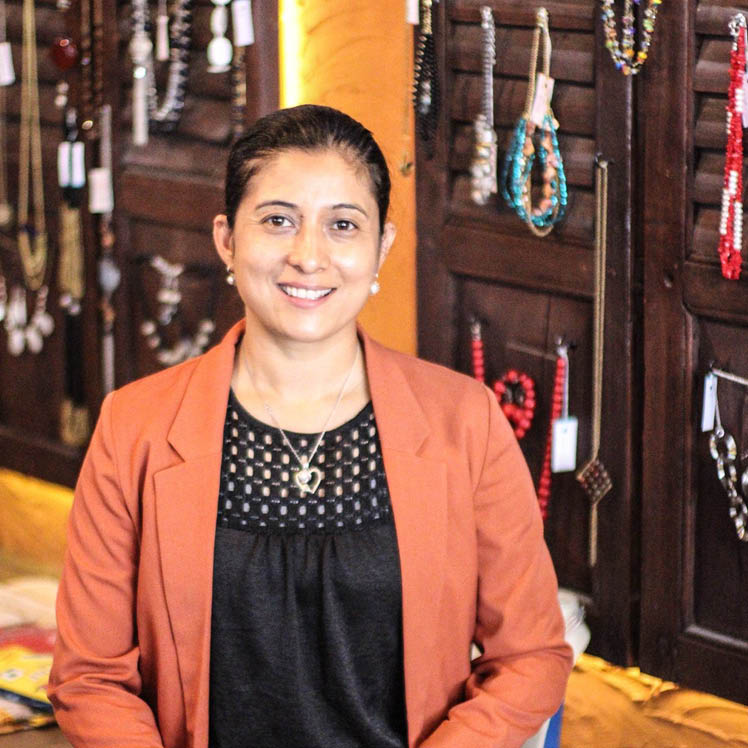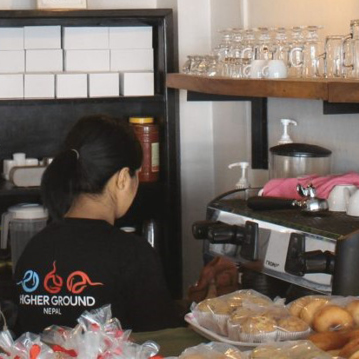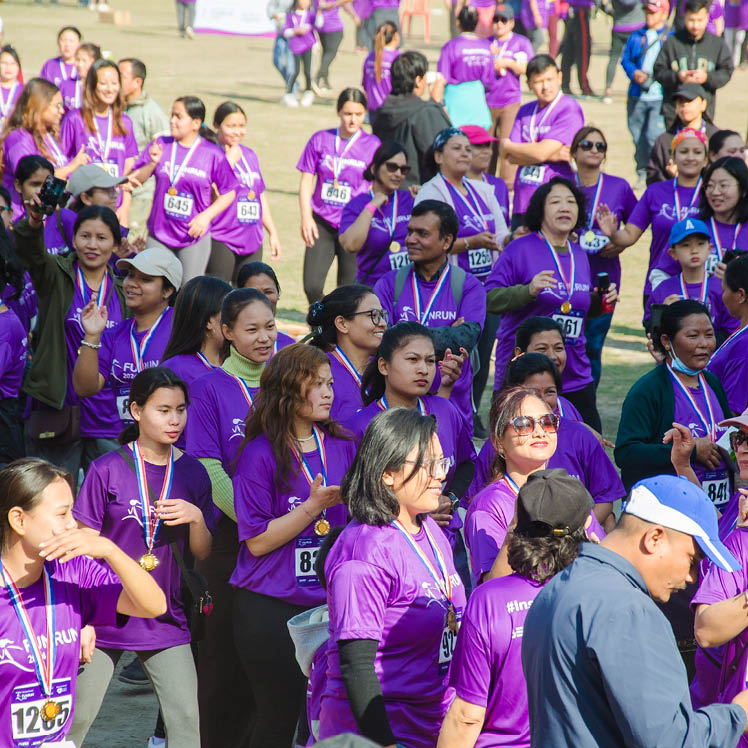Being the Bridge Between Community and Church in Nepal
Higher Ground Nepal is a social enterprise that includes people from all walks of life in Nepal. Proselytizing is not allowed in Nepal, but when people see others living as the genuine presence of Christ in people’s situations, it makes a difference.
Seema Tamang* was 16 years old when she met Bimala Shrestha Pokharel, founder of Higher Ground Nepal (HGN), a social enterprise in Kathmandu, Nepal. Pokharel says in an HGN video that among the more than seven thousand people HGN has worked with—mostly vulnerable women and their children—, Tamang really impressed her.
“Before coming to Higher Ground, I was doing a job that was inappropriate and not good for me at all,” Tamang says in the video. “I faced a lot of problems. (But) I realized there were opportunities to pursue my dreams. I always wanted to become a makeup artist and a beautician. I got the opportunity to learn and train here at Higher Ground to be a beautician. As a business, I am training other women now. I have a good profit from it. Earlier, I myself needed help. Since I worked at Higher Ground I started earning well. Now I help women who are facing difficulties and need help, like I previously needed.”
HGN provides entry-level jobs, classes, counseling, skills training, and grants and loans for small businesses. Its motto— “a just and transformed society where people can live in dignity” —appeals to Nepalis from many religions and socioeconomic situations.
HGN’s businesses help fund its nonprofit community development wing. “People know that I am a Christian and pastor’s wife,” Pokharel says. “Yet as a registered government nonprofit, we need to closely follow government guidance about not proselytizing.”
Pokharel describes herself as called to seek justice. Through HGN, she and her colleagues do business as mission, build bridges between church and community, and create safe spaces for people at risk of abuse, exploitation, and human trafficking. They visibly live as the genuine presence of Christ in people’s situations.
Called to hospitality and justice
“My calling has always been to work for women, children, and youth suffering from injustice, abuse, and exploitation,” Pokharel says. “Hindus value hospitality and being nice and kind to people.” Pokharel originally envisioned living out her calling as a medical doctor.
“My parents are Nepali, and my dad was a general in the Gurkha Brigade of the British military. I was born in Brunei and raised in Hong Kong, but we visited Nepal for two or three months each year,” she says. “I’d already been admitted to medical school in Bangladesh when my dad asked a former colleague from Holland, Michigan, about good schools in the United States. That family had a business foundation and gave me a scholarship to Calvin University in Grand Rapids, Michigan. I felt obligated to go but didn’t want to. My dad asked me to try it for six months.”
Pokharel was Calvin’s first-ever student from Nepal, and her professors didn’t know much about the country. Yet she says she “strongly felt God’s presence on campus” even though she did not become a Christian until her sophomore year. It began with a philosophical engagement through her studies and conversations with professors and fellow students. Her calling expanded to work for justice and share the love of Christ.
She earned a master’s degree in church growth and missions at Calvin Theological Seminary, where her husband, Arbin Pokharel, earned master of divinity degree.
“While we were teaching at Presbyterian Theological Seminary in Dehradun, India,” she says, “my younger sister accepted Christ in our living room. Since then, most of my family members have become Christian. I now work in a totally different context than when I was studying at Calvin. People don’t come to HGN to find logical reasons to believe in God. They come for opportunities to improve their lives. Through our care, many experience the love of Christ, his healing power, and changed lives through the Holy Spirit’s work.”

Bimala Shrestha Pokharel founded HGN.
Doing business as mission
When Pokharel was “just a year-old Christian,” she took a trip to Kenya led by Calvin economics professor George Monsma. There she met Kenyan women whose micro-enterprises gave them opportunities to be witnesses to and share the love of Christ.
“I got a vision to do small things in community and help people become agents of hope through business,” she says. “After returning from Kenya, I changed my major from pre-med to social sciences and Third World development.”
In 2005, she and her husband founded Cross-Way Church in Kathmandu. The fledgling church rented space in a small coffeehouse run by a Christian couple. In 2006, Bimala was asked to take ownership of Higher Grounds Café because the owners were emigrating to the U.S. The next years were for her a whirlwind of raising two young children, building the business, and serving Cross-Way as a Sunday school teacher, youth leader, secretary, and accountant.
“As the church grew, the leadership was formed, and staff were hired, I slowly stepped down from full-time church involvement,” she says. “I still lead a couple of church small groups and help in various women’s fellowship, hospitality, discipleship, and diaconal ministries.”
Like Seema Tamang once was, HGN staff are mostly from backgrounds at risk of poverty, abuse, and exploitation. Though some have been rescued from human and sex trafficking, HGN specializes in prevention, rescuing people from situations that might lead to them being trafficked.
Few employees come to HGN as Christians. Around 90 percent of employees are women, mostly people who moved from villages to Kathmandu for better opportunities. All speak Nepali as their mother tongue. About 40 percent of HGN staff are literate in both Nepali and English, and 40 percent are literate in Nepali. Twenty percent are illiterate, but HGN assists them with adult literacy. For most employees, HGN is their first employer. They move on to start their own businesses or work in more skilled jobs.
“More than seeing myself as a businessperson, I see myself as a social activist and social entrepreneur who does business as a mission,” Pokharel says. “I initialize movements and allow others to take over and run them further. Genesis 2:15 and other Old Testament verses use the Hebrew word avodah to blend the concepts of worship, work, and service. In other words, we can worship God through our lives in work and business.”

Working at Higher Ground Bakery introduces employees to other opportunities.
Being the bridge
“God has called me to be the bridge between our church and community, and HGN is that bridge,” Pokharel adds. “In events that mix Christians and people of other faiths, we cannot mention the words ‘Christianity’ or ‘Christ.’ But following these restrictions has helped us build community partnerships.
“I specialize in connecting people to networks or relationships with social causes that promote justice and goodness. I make friends with people from all walks of society, from government ministers to the most marginalized people. My networks now include lawyers, teachers, police officers, and health workers who care about making Nepal a better place.”
When an abused woman seeks help at HGN, the staff knows which special police unit to bring her to. Residents in its safe home have HGN guardians. “Being cared for by guardians and also by our church leads almost all to become Christian,” Pokharel says. “Each one has a story to share; all experience some degree of healing while at HGN.”
Seema Tamang, for example, lived in an HGN shelter home while receiving support for training to become a beautician and massage therapist. Pokharel says Tamang became a Christian and joined Cross-Way Church, where she met her husband. They now have two children and live in the United Kingdom, where Tamang works as a trainer/manager in a beauty salon.
The café, bakery, and craft businesses help fund HGN’s nonprofit community development wing (HGCDN). The nonprofit prioritizes social justice and equality through employability and entrepreneurship, mental health and well-being, education and awareness, and research and innovation.
Women training at HGN to become bakers, cooks, designers, tailors, beauticians, hairdressers, and other types of entrepreneurs desperately want their children to receive good education. “We work with community schools to provide school uniforms and scholarships so that marginalized children can keep studying and avoid being trafficked,” Pokharel says. “We fund this through our annual Fun Run for freedom and empowerment during March, which is International Women’s Month. The run also raises awareness about human trafficking and connects us with professionals who care about the common good.”
Most professionals who volunteer for HGN as at-risk counselors, trainers, coaches, or health professionals are not Christian. “Our worship should lead us to live faithful lives in the marketplace and not simply keep the gospel to ourselves internally for ‘feel-good’ purposes,” Pokharel says. “We have many things to learn from the Hindus, primarily their close-knit family values. Their devotions to their gods through rituals and sacrifice involve the whole community. We can celebrate these values while being very careful of syncretism.”
Pokharel has discovered that most volunteer professionals feel more comfortable walking into HGN than into a church. “Simply through our work and lives, we are witnessing the love of Jesus,” she notes. “One doctor told me, ‘I’ve never been in a church.’ Some professionals have come to church for our neighborhood Christmas celebration and have even asked for prayer.”

HGN’s annual Fun Run/Walk raises money for school uniforms and scholarships for marginalized children.
Creating safe space
HGN has become a healthy hub to create a safe space for all sorts of people to talk about trauma, Pokharel says.
“I think COVID helped people open up about their struggles, whether with breast cancer or mental health. Our monthly Mental Health Café events have become a popular safe space where mental health professionals and community youth and women gather to learn and share about emerging mental health issues in our society. Our participants speak openly about their challenges and share from their life experiences. These events create opportunities to make appointments with the right doctors, counselors, and psychologists.
“I am very open about my own mental health challenges,” she continues. “About seven or eight years ago, I went through some depression myself. Nepalis in general don’t talk much about mental health. My openness helps youth and women share their struggles and see that it’s OK to take medication and seek professional help.”
Many people outside the church want to be part of what HGCDN is doing, such as the Mental Health Café, annual Fun Run, or observing October as National Suicide Month. So many people have visited HGN over the years to observe its social impact model that its nonprofit wing has started an HGN research and innovation unit. The goal is to conduct research on mental health, social entrepreneurship, women’s empowerment, and socioeconomic development.
As people experience safe spaces at HGN and HCGCN, they often see others praying or ask for healing prayer. “Prayer is an integral part of a practicing Hindu’s life—just not to a personal God who welcomes lament and complaints,” Pokharel says. “I used to pray a lot as a Hindu—more of a wish expressed to a distant god, with a hope of good fortunes. In shamanist village cultures, healing is widely promised and somewhat practiced.
“Prayer is so important in helping people heal from alienation and abuse and accept opportunities to rise out of poverty. And yet we at HGN seek to witness that everyone can do more than just watch and pray. That is because we each have gifts or connections to do something. We hope to inspire young changemakers in Nepal. They can start a business with modest savings or a small loan and then become able to tithe or contribute skills at church.
“Ultimately, though, as my husband often says, we have not been called to change the world,” Pokharel concludes. “We have been called to live faithfully in and for Christ and to let the world see who Christ is as we abide together with the body of Christ we serve.”
*Name changed to protect identity

HGN has become a safe space for talking about mental health issues.
LEARN MORE
Browse other Higher Ground Nepal impact stories and connect on the HGN Facebook page.
Explore the history of Christianity in Nepal through a 2008 Yale University exhibit. In 2005, Bimala Shrestha Pokharel and her husband, Arbin Pokharel, founded Cross-Way Church in Kathmandu. It has become the mother church of the Nepali Reformed Churches denomination.
Partners Worldwide, a network of businesspeople faithfully working to end poverty for good, supports the work of Higher Ground Nepal and other organizations in Southeast Asia and throughout the world.
Check out Calvin Institute of Christian Worship resources on faith and work and worship for workers. Learn more about how trauma affects people and how to include trauma in church worship and life. This conversation with Nikki Toyama-Szeto explains how to maintain hope in God despite injustice.